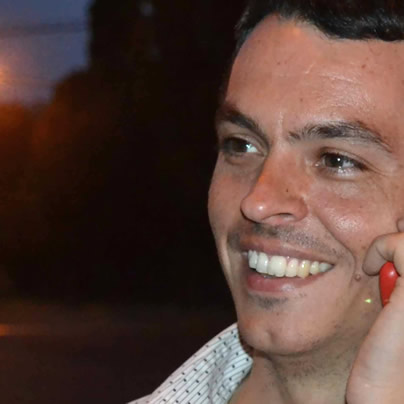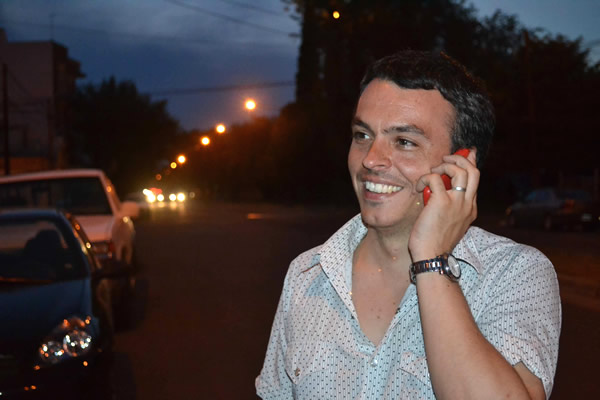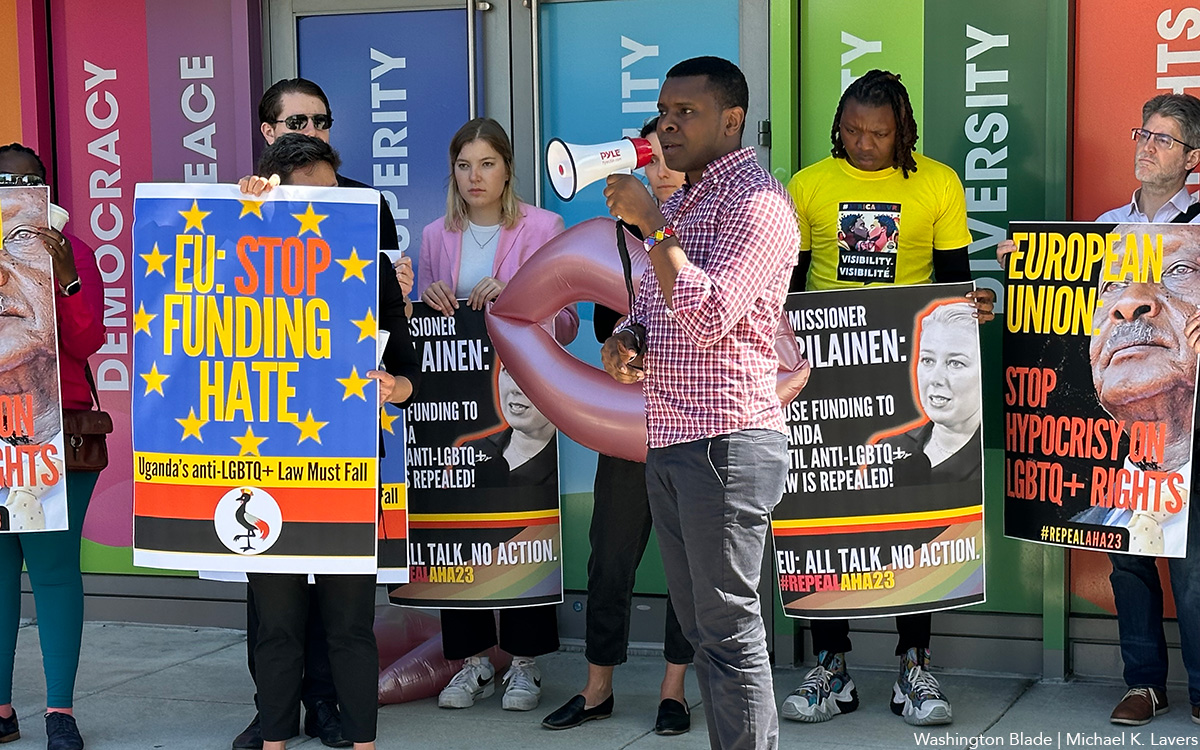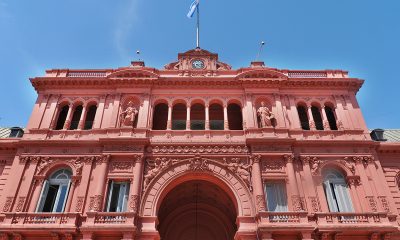World
Argentine gay activist criticizes Pope Francis
Francis led campaign against same-sex marriage in Argentina


Esteban Paulón of the Lesbian, Gay, Bisexual and Trans Federation of Argentina. Photo courtesy of Esteban Paulón.
Argentina’s leading LGBT rights advocate on Wednesday criticized Pope Francis’ strong opposition to marriage rights for same-sex couples.
Esteban Paulón, president of the Lesbian, Gay, Bisexual and Trans Federation (FALGBT,) noted during an interview with the Washington Blade hours after the College of Cardinals elected Francis that he was among the most vocal critics of a same-sex marriage bill that President Cristina Fernández de Kirchner signed in 2010. The new pontiff, who was the-then archbishop of Buenos Aires, described the measure in a letter he wrote to four Argentine monasteries before the country’s Senate approved it as a “machination of the Father of Lies that seeks to confuse and deceive the children of God.”
Francis further categorized the bill as “the work of the devil” that would “spark God’s war.”
“He organized people who mobilized themselves en masse against the equality law and the rights of the collective diversity in moments during which the enormous social and parliamentary consensus that the equality law had in our country was clear,” Paulón said.
Fernández strongly rebuked Francis’ comments.
“It’s worrisome to listen to expressions such as ‘God’s war,’ ‘The work of the Devil;’ things which actually bring us back to the times of the Inquisition, to Medieval Times,” she said while on an official trip to China during the same-sex marriage debate.
The Argentine president further referenced the Crusades as she criticized Francis’ remarks.
“It establishes, as a society, a place which I don’t think any of us wants to have,” Kirchner said. “We are all willing to debate, to discuss, to dissent, but do it within a rational frame without stigmatizing others because they think differently and fundamentally.”
Paulón noted to the Blade that Francis lived in a country in which same-sex marriage has been legal for more than two years.
“This law did not cause any catastrophe, it did not damage the family, it did not cause the destruction of anything,” he said. “It has strengthened families; it has granted rights that have made many people happy.”
Francis, a Jesuit who was previously known as Jorge Mario Bergoglio, was born in Buenos Aires to Italian immigrant parents in 1936.
He became archbishop of the Argentine capital in 1998. Pope John Paul II in 2001 appointed him cardinal.
Francis was also reportedly the runner-up in 2005 when the College of Cardinals elected Benedict XVI to succeed the previous pontiff.
In addition to his opposition to marriage rights for same-sex couples, Paulón noted the new pope also spoke out against Argentina’s law that allows trans people to legally change their gender without sex-reassignment surgery. Francis has also claimed that adoption rights for gays and lesbians in the country constitutes discrimination against children.
The new pontiff has also been outspoken against efforts to allow abortion and in-vitro fertilization in Argentina.
A journalist in 2005 accused Francis of conspiring with the military junta that governed the country from 1976 to 1983 to kidnap two Jesuit priests. Up to an estimated 30,000 Argentines died or disappeared during the so-called dirty war, but Francis in 2010 told a court he actually tried to help the priests and others whom the regime had targeted.
In spite of the controversies, he has reached out to people with HIV/AIDS.
The National Catholic Reporter reported he kissed and washed the feet of 12 AIDS patients at a hospice he visited in 2001. Francis has also defended the poor and the public sector.
“On some issues the church has a discourse of mercy, of piety, of compassion,” Paulón said.
Francis faces criticism from other Latin America activists
Other LGBT rights advocates throughout the region have also criticized Francis, who is the first non-European pope.
“The Vatican and the entire hierarchy of the Catholic church have once again shown indifference at the very least to the human rights of people, electing as their highest representative someone who has stigmatized and offended the love between same-sex couples, calling it a danger to the family, for children and as a move towards the devil,” a spokesperson from the Movement for Homosexual Integration and Liberation, a Chilean LGBT rights group, said in a statement.
Ricardo Montenegro Vásquez, director of Orgullo LGBT Colombia, also spoke out against Francis’ election.
“With his election, the Vatican conclave insists on sowing prejudice and hate against some people who more than simply repudiating, deserve understanding and social inclusion,” he said.
Rev. Victor Bracuto of the Metropolitan Community Church in Buenos Aires, pointed out Francis’ advocacy for the poor and speaking out against corruption. He also highlighted the pontiff’s opposition to Argentina’s same-sex marriage and gender identity laws and his reputed ties to the military junta.
Bracuto described the conclave’s decision to elect Francis as a “strategic political decision” in a statement he e-mailed to the Blade.
“He will be a pope of friendly discourse with the poor, austere and pious, but a cloud will continue to hang over his head over the dictatorship, excluding the GLBTI collective,” he wrote. “He will seek to ensure that the ‘politics of right’ do not spread.”
In spite of her previous statements against the new pope, Fernández congratulated Francis in a statement she issued shortly after the College of Cardinals elected him. She will also attend his installation Mass in Rome on March 19.
“It is our desire that you have, assuming the helm and guidance of the church … successfully carry out your extremely important pastoral charge in pursuit of justice, equality, fraternity and peace for mankind,” Kirchner said.
Paulón acknowledged many of his countrymen feel a sense of pride over Francis’ election.
More than 75 percent of Argentines are Catholic, but Paulón concedes he does not feel the church’s opposition to same-sex marriage and other issues will change under Francis’ pontificate.
“We would like to be optimistic but we do not have much reason to be so,” he said.
European Union
Activists demand EU sanction Uganda over Anti-Homosexuality Act
Yoweri Museveni signed law on May 29, 2023

More than a dozen activists who protested in front of the European Union Delegation to the United States in D.C. on Thursday demanded the EU to sanction Uganda over the country’s Anti-Homosexuality Act.
Hillary Innocent Taylor Seguya, a Ugandan LGBTQ activist, and Global Black Gay Men Connect Executive Director Micheal Ighodaro are among those who spoke at the protest. Health GAP Executive Director Asia Russell also participated in the event that her organization organized along with GBGMC and Convening for Equality Uganda, a Ugandan LGBTQ rights group.
Ugandan President Yoweri Museveni last May signed the Anti-Homosexuality Act that, among other things, contains a death penalty provision for “aggravated homosexuality.”
The country’s Constitutional Court on April 3 refused to “nullify the Anti-Homosexuality Act in its totality.” A group of Ugandan LGBTQ activists have appealed the ruling.
A press release that Health GAP issued ahead of Thursday’s protest notes EU Commissioner for International Partnerships Jutta Urpilainen on March 6 announced more than €200 million ($212.87 million) for Uganda in support of “small business owners, young female entrepreneurs, agribusinesses as well as vital digital infrastructure projects in full Team Europe format with the European Investment Bank (EIB) and several member states.”
“These concrete initiatives will make a difference to aspiring entrepreneurs, Ugandan businesses and create jobs in multiple sectors,” said Urpilainen in a press release that announced the funds. “This is a perfect example of how Global Gateway can make a tangible difference for citizens and businesses and unlock the full potential of a partner country by working together.”
Convening for Equality Uganda on Tuesday in a letter they sent to Urpilainen asked the EU to review all funding to Uganda and “pause or reprogram any funds that go via government entities.” The protesters on Thursday also demanded European Commission President Ursula von der Leyen “to hold Ugandan President Museveni’s government accountable for this attack on human rights.”
Josep Borrell, the EU’s top diplomat, in a statement he released after Museveni signed the Anti-Homosexuality Act said the law “is contrary to international human rights law and to Uganda’s obligations under the African Charter on Human and People’s Rights, including commitments on dignity and nondiscrimination, and the prohibition of cruel, inhuman or degrading punishment.”
“The Ugandan government has an obligation to protect all of its citizens and uphold their basic rights,” said Borrell. “Failure to do so will undermine relationships with international partners.”
“The European Union will continue to engage with the Ugandan authorities and civil society to ensure that all individuals, regardless of their sexual orientation and gender identity, are treated equally, with dignity and respect,” he added.
Urpilainen last September in a letter to the European Parliament said the EU would not suspend aid to Uganda over the law.
India
Indian political parties for the first time include LGBTQ rights in election platforms
Voters will begin to cast ballots on April 19

The world’s largest democratic exercise will begin in India on April 19 as citizens begin to cast their votes in the country’s election.
This year’s election is different because national level political parties for the first time are promising to extend marriage rights to same-sex couples as part of their election platforms.
The Indian National Congress, one of India’s oldest political parties, promised after wide consultation that it would introduce a bill that would recognize civil unions between couples who are part of the LGBTQ community. The party, which has governed India for the majority of the period since independence from the U.K. in 1947, has refrained from taking a stance on laws that include Section 377, which criminalized consensual same-sex sexual relations.
Then-Health Minister Gulam Nabi Azad in 2011 when the INC was in power said homosexuality is a disease. He made the controversial comment while speaking at an HIV/AIDS conference in New Delhi, the Indian capital.
“Unfortunately, this disease has come to our country too,” said Azad. “Where a man has sex with another man, which is completely unnatural and should not happen but does.”
When the Delhi High Court was hearing the Naz Foundation case, the Home Affairs Ministry opposed the striking down of Section 377 based on its belief that homosexuality cannot be morally condoned. The INC never struck down Section 377, which criminalized homosexuality, in parliament.
A 5-judge panel on the Supreme Court on Sept. 6, 2018, decriminalized consensual same-sex sexual relations.
The Communist Party of India (Marxist) on April 4 unveiled its platform with a range of socialist commitments, including support for LGBTQ rights. Among these pledges is to amend the Transgender Persons (Protection of Rights) Act 2019 to address community concerns and ensure legal recognition and protection for same-sex couples akin to marriage.
The platform also outlined plans to introduce a bill similar to the Special Marriage Act of 1954, which allows partners to be listed as dependents and facilitating like inheritance, alimony in the event of divorce and other issues. The party further pledged to enact a comprehensive anti-discriminatory bill that would include LGBTQ people, ensure quotas in educational institutions and implement horizontal reservations in employment.
Addressing the issue of crimes against LGBTQ people, the platform promised to treat such offenses on par with crimes against heterosexuals. The platform also calls for tackling bullying, violence and harassment of gender non-conforming and LGBTQ people in educational settings, enforcing anti-hazing policies and combating hazing based on sexual orientation and gender identity.
The platform further touched issues related to transition and informed consent.
The Special Marriage Act of 1954 is a law that provides for civil unions among Indians and Indian nationals who live abroad, regardless of the religion or faith followed by either party. This law enables people from two different religious backgrounds to enter into marriage. Parliament in 2019 passed the Transgender Persons (Protection of Rights) Act that extended rights to trans people.
Brinda Karat, a former member of the Rajya Sabha, the upper house of the Indian Parliament, and leader of the Communist Party of India (Marxist), spoke with the Washington Blade and said the current government has homophobic ideas that are not acceptable to the party.
The ruling government under Prime Minister Narendra Modi is striving to secure more than 400 parliament seats in the upcoming election, aiming for a substantial majority.
Various polls conducted by Indian news organizations indicate a probable victory for the ruling Bharatiya Janata Party. In response to the BJP’s dominance, Congress and several national and regional parties have joined forces as the Indian National Developmental Inclusive Alliance.
This alliance comprises 26 opposition political parties. Despite its formation, however, there is no clear coalition strategy in place and only two parties have included LGBTQ-specific policies in their election platforms.
The Blade reached out to Congress’ spokesperson for comment, but has not received a response. The BJP also did not respond to a request for comment.
The party has yet to release its election platform.
Ankush Kumar is a reporter who has covered many stories for Washington and Los Angeles Blades from Iran, India and Singapore. He recently reported for the Daily Beast. He can be reached at [email protected]. He is on Twitter at @mohitkopinion.
Africa
Ugandan activists appeal ruling that upheld Anti-Homosexuality Act
Country’s Constitutional Court refused to ‘nullify’ law

Twenty-two LGBTQ activists in Uganda have appealed this month’s ruling that upheld the country’s Anti-Homosexuality Act.
The Constitutional Court on April 3 refused to “nullify the Anti-Homosexuality Act in its totality.”
President Yoweri Museveni last May signed the law, which contains a death penalty provision for “aggravated homosexuality.”
The U.S. subsequently imposed visa restrictions on Ugandan officials and removed the country from a program that allows sub-Saharan African countries to trade duty-free with the U.S. The World Bank Group also announced the suspension of new loans to Uganda.
Media reports indicate Sexual Minorities Uganda Executive Director Frank Mugisha and Jacqueline Kasha Nabagesara are among the activists who filed the appeal.
-

 Africa4 days ago
Africa4 days agoCongolese lawmaker introduces anti-homosexuality bill
-

 District of Columbia16 hours ago
District of Columbia16 hours agoReenactment of first gay rights picket at White House draws interest of tourists
-

 World4 days ago
World4 days agoOut in the World: LGBTQ news from Europe and Asia
-

 Arizona20 hours ago
Arizona20 hours agoAriz. governor vetoes anti-transgender, Ten Commandments bill












